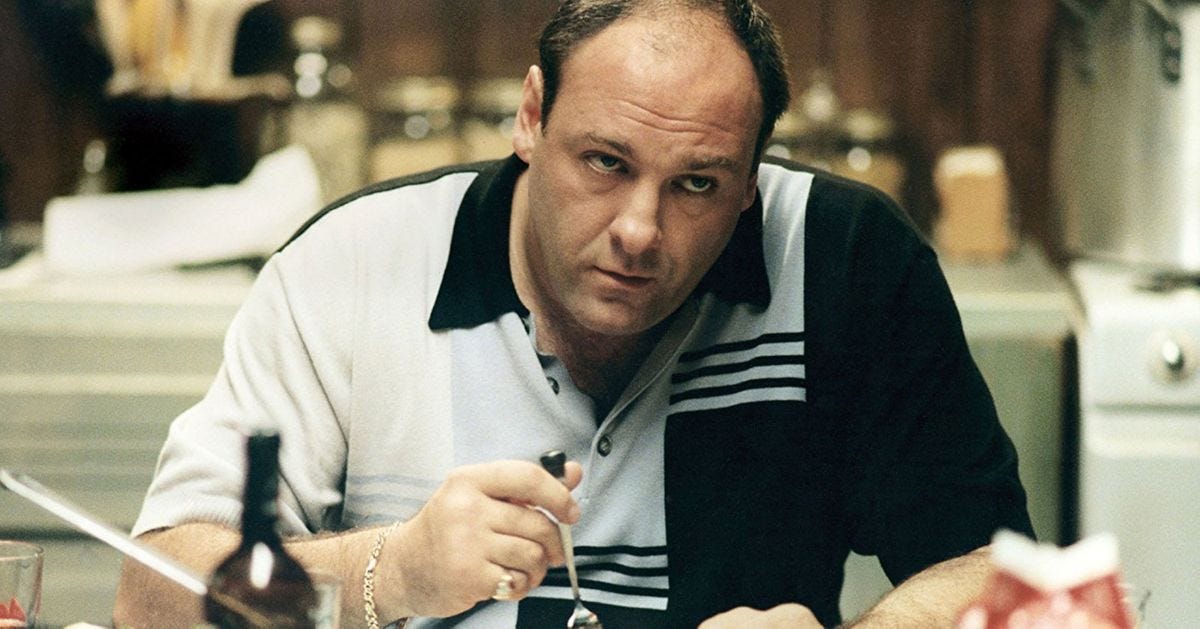A critic I once discussed HBO’s classic TV show The Sopranos with told me: “The Sopranos is the void, and Deadwood is the way to crawl out of it.” Years later I’m still not sure what he meant by that, but every time I revisit David Chase’s cult series, I think I’m getting a step closer to understanding him.
The more I watch Tony Soprano (James Gandolfini), the more I find I have in common with him: his worldview, values, principles, anger issues and mental health problems. He’s a malicious man with a bad temper, but he can also be a caring person with affection for other people; and that’s just a few of the many reasons why The Sopranos appealed to men twenty years ago, and it still appeals to them today.
Therapy
As the pilot of the series begins, we see Tony sitting in a psychiatrist’s waiting room. He’s slightly nervous, and it won’t take long until he admits that he doesn’t believe in therapy. He says at one point, “Nowadays, everybody’s gotta go to shrinks, and counselors, and go on ‘Sally Jessy Raphael’ and talk about their problems. What happened to Gary Cooper? The strong, silent type.” He fails to realize that no matter how much he wants to belong to the Gary Cooper-type he refers to, he’s not like that at all. He suffers from constant panic attacks and has a bumpy relationship with his narcissistic mother.
His generation is the masculine macho men who didn’t cry, never complained, and didn’t talk about their feelings. Chase deconstructed that stereotype throughout the show and revealed that even the ‘toughest people,’ those in the mafia, have mental health problems. In 1999, that was an unorthodox way to portray gangsters in television and film.
When I was in college, in my early 20s, I was depressed. Depression isn’t about being sad as many people tend to misinterpret it; it’s about experiencing apathy towards the things that once brought us joy or even any type of emotion at all.
At the time, I was in therapy for six months, and just like Tony, I also didn’t believe in its effectiveness. If you managed to read this far and you’re a friend of mine, this is my confession to you. Apart from my parents and ex-girlfriend, nobody knew that I had sought help. Even ten years ago, psychotherapy had stigma all over it, and all of my buddies considered it a time-and money-wasting hoax. Most equated it to visiting a fortune teller. So, I kept it secret.
In retrospect, therapy probably saved my life and guided me towards a mindset that helped me overcome my biggest weaknesses and fears. Luckily, I didn’t require any medication, and simply talking to a professional about my issues helped me in more ways than I could have imagined. The shrink I visited regularly diagnosed me with addictive tendencies. That was something I hadn’t recognized then but would recognize as true years later. Thanks to her, I was able to deal with it before it ruined my life. She explained how toxic behavior can be hereditary, and how genetics play a huge part in developing mental health symptoms. My uncle was an alcoholic, and I could have inherited my addictions from him.
In The Sopranos, Tony’s major flaw is that he’s incapable of admitting that therapy works. Every time he struggles in his life, he blames it on therapy. When things don’t turn out in his favor, he blames the psychiatrist, Dr. Melfi (Lorraine Bracco), and her approach. He blames the medications she prescribed him, although he was making progress. He had begun to have fewer panic attacks, and has experienced some relief with his depression; still, he blames the therapy when something goes wrong.
Unlike Tony, I was able to understand how much the treatment crucially affected my mental health. I became a more conscientious and rational person. I slowly got rid of the toxic thinking, and I avoided continuing certain behavioral patterns that kept me crippled with fear. I couldn’t engage in social situations if I didn’t “know” their exact outcome. I was scared to meet new people or be involved in circumstances I couldn’t control.
After therapy, I was capable of managing negative thoughts, and I became more open-minded when it came to relationships.
I learned that in therapy, the treatment can work, but it requires effort and belief from you, the patient. Otherwise, you’ll just crash into walls without understanding that, with the right tools, you can climb over them.
The fear I’ve felt before never disappeared completely from my life, but now I have the methods necessary to manage my issues.
Keep reading with a 7-day free trial
Subscribe to The Screen to keep reading this post and get 7 days of free access to the full post archives.



